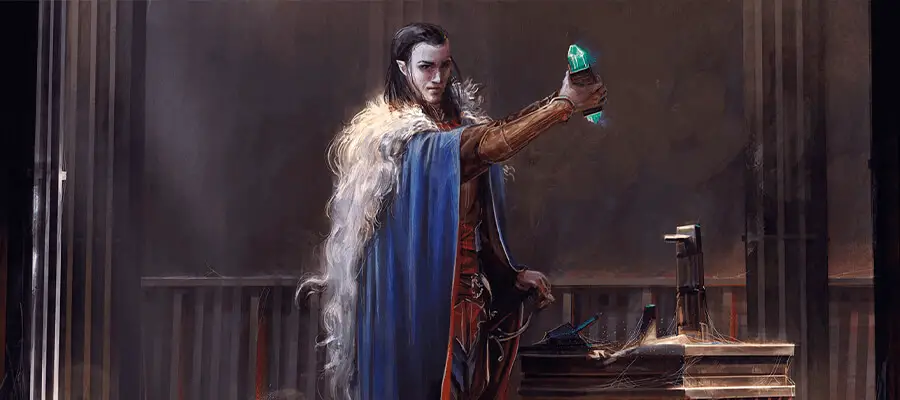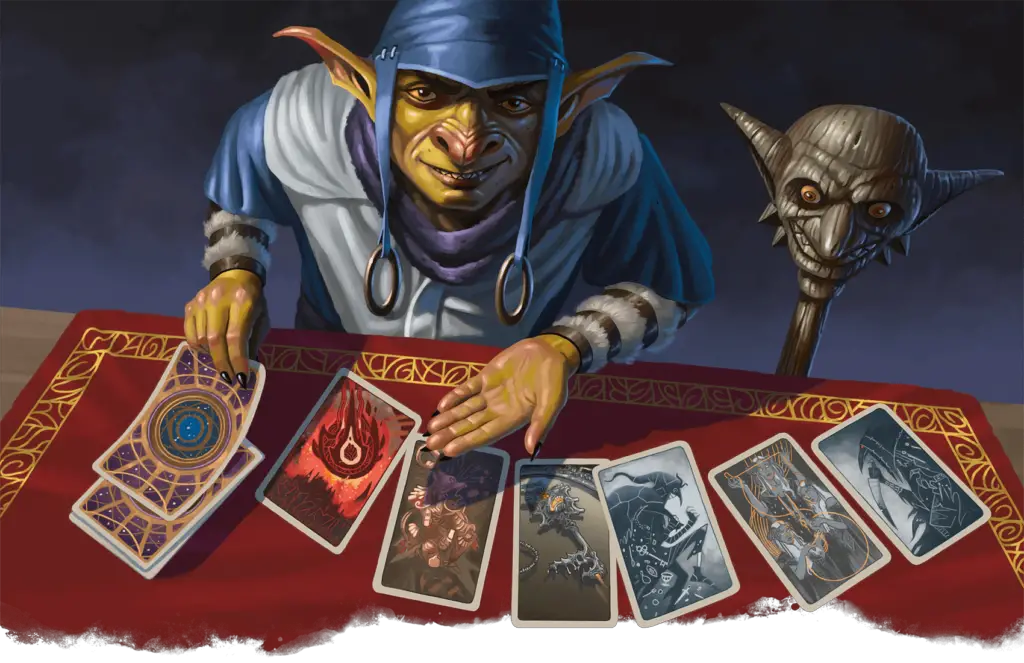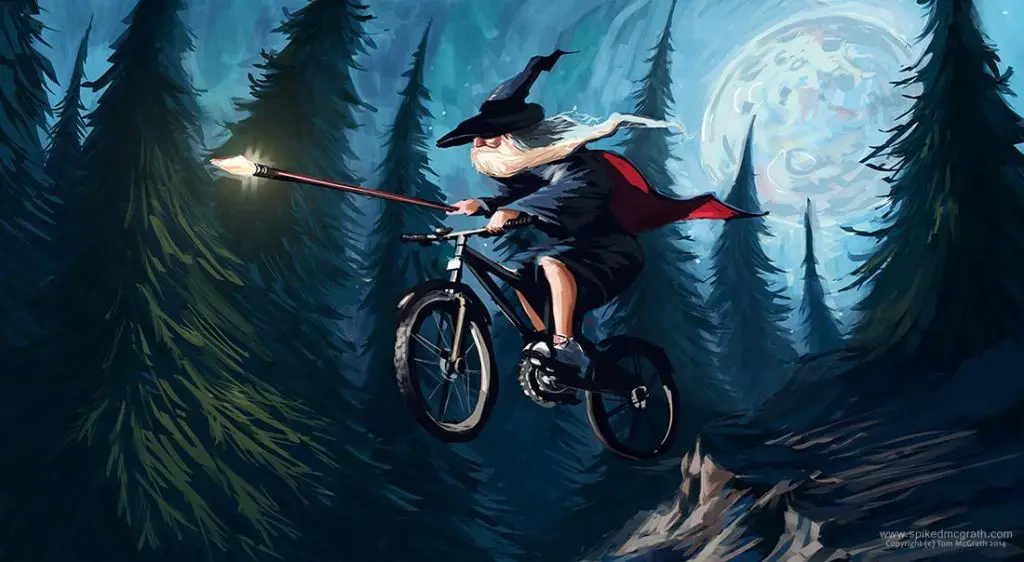“New Year in the tavern” by Janonna-art, Creative Commons Attribution-Share Alike 3.0 License
This article contains affiliate links that add gold to our coffers.
During my years as an improvisational comedian, I’ve striven to improve my ability to enliven characters I create with unique voices and physicalities. Though I’m not a trained actor, I’ve received basic voice coaching and stage presence tutorials. I’ve also learned and discovered a variety of methods that help me develop voices. I’ll share what I’ve learned so you can hone your own voice acting skills.
Developing Voices and Accents
Some of these tips might sound obvious for developing a voice, and many of them overlap. Brace yourself for a long process even if my advice is brief. Don’t be afraid to feel silly. Let’s get started!
Positive Attitude
Develop a willingness to fail. I hear many of my friends describe themselves as feeling stupid when they try to alter their voices for roleplaying. I’ve also experienced many DMs who attempt to alter their own voices as they portray various NPCs, but they often stick to 3-5 accents and mannerisms they’re comfortable with. This hesitance to try new things often comes from a fear of failure, embarrassment, or timidness.
If this sounds like you, I recommend reading my article about improv principles that can help D&D hobbyists. You’ll want to adopt a paradigm that allows you to actually embrace failure as a pathway to growth. Embarrassment ceases to matter when you realize other people are usually more concerned with themselves than they are about you, and they probably admire how you try new things (even if they’re vocally negative about your attempts, which should be rare). You can also develop manners of speaking without being offensive to whichever group of people tends to be the origin of a speech pattern.
Technique and Practice
There are basic techniques that I’ve been taught by a variety of reliable sources, including a voice coach. You need to notice where the energy is in your mouth when you speak or sing. Some accents live at your lips while others are at the back of your throat. Focusing your voice’s energy on your gut, throat, tongue, teeth, and lips will produce a different effect for whichever instrument (body part) you’re playing.
YouTube has a plethora of tutorials about accents that you can watch and study. There are many videos created by competent voice coaches to explain accents, dialects, slang, and more. I like to listen to these tutorials in the car or during work.
You can listen to people that have a particular accent to notice how they pronounce certain words and what slang they use. Write down anything you notice so you can review it later and commit the observation to memory as you practice. Music is a useful teacher if you want something to listen to. Find a song that you enjoy whose singer has an accent. Listen to the nuances of a singer’s speech patterns to take note of words that stick out as different from your own vernacular. One such song that I use for practicing a Scottish accent is “I’m Gonna Be (500 Miles)” by the Proclaimers. Another song that stretches my vocal skills is “Hurt” performed by Johnny Cash; his speech pattern is deep from the diaphragm, which I’m less used to. If you really want to challenge yourself, try listening to “Someone to Love” and imitate Queen singer Freddy Mercury. You don’t have to sing as well as him, but you can identify patterns in his speech that would lend to a worthy impression.
Use a mirror to practice. Pay attention to how your mouth and lips are positioned when you achieve a voice you like. It’ll help your consistency. For example, I noticed that when I imitate Sean Connery’s accent, my best attempts occur when I purse one corner of my mouth while talking from the other; it looks like I’m only speaking with half of my mouth.
Practicing with a friend will be especially helpful. Carry a conversation where you’re both using accents (same or different). After speaking for a few minutes, talk about what you’re both observing.
When developing an accent, it’s normal to worry about offending a person whom you imitate. Try not to let it stop you from trying though. To remain sensitive to other cultures and peoples, take note when you subconsciously use a certain accent paired to a type of person, then mix it up to defy the expectation. Several examples of stereotypical pairings include the following: southern United States accent for uneducated people, Russian for evil schemers, Spanish for sultry swashbucklers, and English or French for snobs. It’s not bad to use these pairings, but gaining awareness will allow you to be inspired with ideas off the beaten path.
Word Choice
Slang words are valuable tools for portraying a character. You can enhance any accent with slang and catchphrases. Try using foreign slang as part of your own day-to-day lexicon, and the repetition will serve you well.
Pick a phrase that gets you into the accent. My phrases that get me in the mindset for an accent include the following (I don’t know why some of these work for me, but they do):
- Irish: “Top of the mornin’ to ya”
- Eastern European: “Hello, watch as I apply my antiperspirant” (this one involves alternate pronunciation of ‘antiperspirant’)
- Scotish: “AUGH! Me retirement grease!” or “Look at the size of that boy’s head…” (kudos to you if you know these references)
- Kiwi: “Ah bro! When’s the feed, eh?” or “He’s a real shocker, that one”
- Australian: “G’day. She’ll be right mate. Good as gold.”
- French raspy: “Ho ho ho!”
- French flamboyant: “Wee wee!”
- Canadian: “Hello there, welcome to my house” (alternate pronunciation of ‘house’)
A popular example of this phrase concept (I suspect) is when Laura Bailey plays the part of her character Jester on Critical Role; she often says “You know…” This could be a fun character quirk or trick to staying in character.
Experimentation
It’s ok to experiment with an accent. Sometimes I don’t settle on a permanent voice for a character for several sessions. I might tell other players that I’m playing around with the accent until I settle on what’s consistently working while being fun for the group.
When you settle comfortably into a set of accents, you can joyously explore variations of those accents. Here are several ways to experiment with your accents:
- Move your diaphragm in different ways.
- Make your accent more masculine/feminine, timid/bold, fast/slow, educated/uneducated. Change the attitude that you experience when you are using your accent.
- Use the rest of your body to try physicalities that fit the accent. You might be surprised at how much you can alter a character just by changing your posture. You can also move in ways to make a character adopt the traits of a particular animal.
- Picture yourself with a prop, animal, posture, or attitude that fits the character, and pantomime it as you speak.
You can learn more about improv and other D&D skills in my other articles on the subject:
Conclusion
Developing a voice can be intimidating, but you can develop voice acting if you take it on one bite at a time. Some methods I described may not work for you, but I’m sure at least a few of them will help you at whatever your skill level is. Just remember to practice and take note of what works for you, and don’t get stuck in your head thinking about how dumb you think you seem as you attempt voices that are not your own. People are too concerned with what others think of them to judge your voice acting, and they’ll admire your bravery as you give it a go.
What methods do you use for creating voices? Which of my methods are you going to try? I’d love to hear about your experiences, so please don’t forget to come back and tell me how it goes. Thank you for reading! We have plenty of other D&D articles for you to browse, so I’ll see you in the next one.





Excellent article, more DM’s should embrace this kind of homework.
But a small plea: for everyone contemplating doing an Australian accent, I beg of you to please, please, watch an Australian television show first (Netflix should have a few), so that you get an understanding of what we really sound like. There are so many terrible fake Aussie accents out there, and it’s honestly painful, and considering we’re speaking the same language, they just don’t need to be as bad as they are!
Hi Greensleeves,
Haha, yes, that’s a good recommendation. I don’t know if it’s the same thing you’re getting at, but I find that fake accents are often exaggerated. They often need to be dialed back to be more conversational and accurate. Watching a genuine television show that features people of a region is a good tip.
Thank you for the compliment, too. 🙂
Bloody oath mate! Crickey! Strewth!
I’ve lived in ‘straya for 20 years and almost no-one I’ve met sounds like Steve Irwin.
And most people from overseas I hear trying to do an Aussie accent sound more like a saffa and a kiwi hooked up… 🙁
Hi Jay, I totally agree with you. I lived in New Zealand for a while and picked up Kiwi inflections, but the slang was the best part. One of my good friends in New Zealand was from Brisbane, and his accent started to morph into sounding like a saffa (he was often asked if he was). Accents are funny things, eh? 😛 There are technically many variations of any given accent, but there is usually one form that becomes popular for impersonations (usually through pop culture icons like Steve Irwin).
Americans similarly get annoyed with people overseas slaughtering their accents through caricature impersonations.